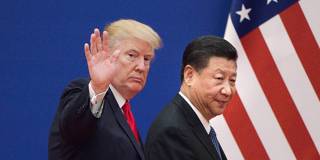The benefits that the US reaps from having the world's main international currency are diminishing with the rise of the euro and renminbi. And now President Donald Trump’s misguided trade wars and anti-Iran sanctions will accelerate the move away from the dollar.
NEW YORK – Back in 1965, Valéry Giscard d’Estaing, then France’s Minister of Finance, famously called the benefits that the United States reaped from the dollar’s role as the world’s main reserve currency an “exorbitant privilege.” The benefits are diminishing with the rise of the euro and China’s renminbi as competing reserve currencies. And now US President Donald Trump’s misguided trade wars and anti-Iran sanctions will accelerate the move away from the dollar.

NEW YORK – Back in 1965, Valéry Giscard d’Estaing, then France’s Minister of Finance, famously called the benefits that the United States reaped from the dollar’s role as the world’s main reserve currency an “exorbitant privilege.” The benefits are diminishing with the rise of the euro and China’s renminbi as competing reserve currencies. And now US President Donald Trump’s misguided trade wars and anti-Iran sanctions will accelerate the move away from the dollar.